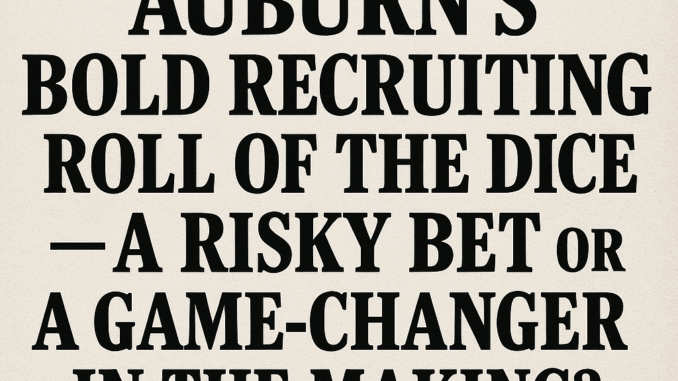
Casagrande: Auburn’s Bold Recruiting Roll of the Dice — A Risky Bet or a Game-Changer in the Making?…Read More…
In the cutthroat world of college football, where national championships hinge on the decisions of 17- and 18-year-olds, recruiting is as much an art as it is a science. Few programs understand this delicate balance better than Auburn. And yet, under head coach Hugh Freeze’s regime, the Tigers are embracing a daring new approach that’s sending shockwaves through the SEC: they’re betting big on high-ceiling, high-risk talent. The question on everyone’s mind — will this gamble redefine Auburn football or derail its hopes of returning to elite status?
The Calculated Risk
At first glance, Auburn’s 2025 recruiting class might seem like a mixed bag. Ranked No. 13 nationally by 247Sports and No. 10 by Rivals, it boasts impressive numbers but lacks the polish of Alabama’s or Georgia’s traditionally bulletproof classes. However, peel back the layers and it becomes clear: Auburn isn’t just recruiting athletes — they’re targeting potential.
“We’re not here to win recruiting rankings,” Freeze stated bluntly at SEC Media Days. “We’re here to build a program that can win consistently, not just once every five years. That means sometimes you take chances on kids who aren’t five-star ready today, but will be on Sundays in three years.”
This philosophy marks a sharp turn from Auburn’s more conventional recruiting strategies in years past, which emphasized safe, proven prospects who fit traditional molds. Under Freeze, the staff has focused on raw speed, explosiveness, and positional versatility — even if it comes at the cost of immediate impact or recruiting polish.
Betting on Development
Take, for example, defensive end Kamarion “Kam” Davis, a three-star prospect from a small Georgia high school. At 6’5″ and 225 pounds, Davis is a freakish athlete with a 4.6-second 40-yard dash and a 37-inch vertical. Yet, he’s raw. He’s only played organized football for two years and lacks refined technique. Despite this, Auburn offered him early — before most SEC schools even knew his name.
“Kam reminds me of a young Arden Key,” defensive coordinator Ron Roberts said. “He’s got that bend, that explosion. He’s not a finished product, but that’s why he’s here. We develop talent.”
Auburn is also leaning into the transfer portal, targeting players with untapped potential who may have been buried on depth charts at other schools. In some cases, these athletes have had off-the-field red flags or academic concerns, but the Tigers’ coaching staff believes in second chances — and in their ability to mentor.
NIL as a Weapon and a Challenge
A key component of Auburn’s recruiting strategy is its aggressive use of NIL (Name, Image, and Likeness) deals. With support from the Tigers’ collective, On To Victory, the program has been able to offer compelling NIL packages that rival those of traditional powerhouses.
However, this strategy is not without controversy. Critics argue that it creates a culture of entitlement or fosters players who may not be as committed to team success. Freeze, however, insists that Auburn’s approach is strategic, not reckless.
“NIL is part of the landscape now,” he said. “We use it to reinforce our message: come to Auburn, and we’ll invest in your future — on and off the field.”
Still, observers worry about long-term sustainability. Can Auburn continue to attract talent without results on the field? And will the gamble on high-upside recruits pay dividends before the pressure mounts?
Eyes on 2025 and Beyond
The 2025 season will serve as a pivotal proving ground for Freeze and his staff. After finishing 8-5 in 2024 — a step in the right direction but far from championship contention — expectations are rising. The new recruits may not be immediate starters, but they’ll be expected to contribute in specialized roles.
One name to watch is quarterback Treylen Carter, a four-star dual-threat phenom out of Louisiana. With blazing speed and a cannon arm, Carter has drawn comparisons to Lamar Jackson. But with only one season as a varsity starter, he’ll need time to adjust to SEC defenses. Freeze, however, is willing to be patient.
“Treylen’s going to be a star,” Freeze said. “Maybe not tomorrow, but soon. You don’t find talent like his every day.”
On the defensive side, JUCO transfer linebacker Elijah Rivers is expected to anchor a revamped linebacker corps. Rivers, who took an unconventional path through junior college and battled off-the-field challenges, is emblematic of the type of player Auburn is targeting — resilient, talented, and overlooked.
The Verdict: Genius or Gamble?
Only time will tell whether Auburn’s new recruiting strategy will pay off. If Freeze can turn these raw athletes into stars — and if the Tigers can climb back into the SEC’s top tier — he’ll be hailed as a visionary. But if the gamble fails, Auburn risks falling even further behind in the ever-evolving arms race of college football.
For now, Auburn fans are caught between hope and hesitation. The potential is undeniable, but the road ahead is uncertain. Freeze isn’t playing it safe — and in the hypercompetitive world of SEC football, that might be exactly what Auburn needs.
One thing is clear: the Tigers aren’t just betting on players. They’re betting on a belief — that in a world of polished prospects and algorithmic evaluations, heart, hunger, and raw talent still matter.
And if they’re right? Auburn’s gamble might just be the spark that reignites the Plains.
Leave a Reply